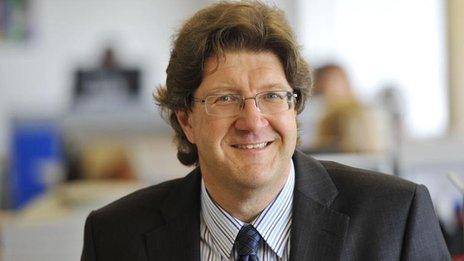Mark Byford: £1m BBC pay-off 'not greed'
- Published

Byford was the BBC's deputy director general between 2004-2011
Mark Byford, the former deputy director general of the BBC, has defended a controversial pay-off package that saw him leave the BBC with £949,000.
He told BBC Radio 5 live's Victoria Derbyshire: "I absolutely don't think it was greed on my part at all".
Byford left the BBC in 2011 after being made redundant as part of a drive to cut the number of highly-paid senior executives at the BBC.
He sidestepped questions about paying any of the money back.
He said the pay-off was "properly approved" and added: "I absolutely think I've done no wrong."
A report by the National Audit Office (NAO), released in July this year, criticised the BBC for paying out £25m in severance to 150 outgoing senior BBC managers - £2m more than their contracts stipulated.
Byford's payment was revealed to be the highest at £949,000, after 32 years of service at the BBC.
Byford, speaking to Derbyshire during an interview to promote his new book, admitted it was a large sum but said that he had not wanted to leave the corporation.
"I lost my job, I was made redundant, I left when I was told to leave by the BBC. After 32 years of working there I was devoted to the corporation," said Byford.
"It was a lot of money and it was in a context that I was the number two at the BBC and I'd served more than 30 years there.
"It was in a context of being made redundant in a very big cull of senior management. I felt very strongly myself that it should touch every level including right at the very top."
He continued: "I didn't want to go, I loved my job but I absolutely understood that if it [redundancy] touched me I would accept it."
'Value for money'
When Byford left the BBC in 2011 his pay-off was made up of 12 months' salary worth £474,500, with a further £474,500 pay in lieu of notice, despite the fact that he had stayed on to work on coverage of the Olympics and the royal wedding.
He also received £73,000 for holiday he had not used since 2004.
Former director general Mark Thompson, who oversaw Byford's payment, was questioned about the issue by MPs on the Public Accounts Committee in September this year.
He told them that Byford's pay-off had represented "value for money" and denied current director general Tony Hall's claims that the BBC had "lost its way".
Mark Byford: 'I absolutely think I've done no wrong'
Since taking up the job in April Lord Hall has introduced a cap on BBC severance payments of £150,000.
When asked by Derbyshire if he deserved his payout, Byford said it was what had been approved by the "appropriate body" at the BBC, the remuneration committee.
"I wasn't there, I took no part in it and I was given what I was given," he said.
He added that he had not entered into any salary negotiations "since the day I joined the BBC aged 20 on a holiday job".
Savile allegations
In September, former BBC chairman Lord Grade defended Mark Byford's pay-off during an interview on BBC Newsnight, and said he was a "great asset to the BBC".
Lord Grade also suggested that Byford could have prevented recent crises at the BBC, including the failure to broadcast a Newsnight investigation into sex abuse allegations against Jimmy Savile.
However on Tuesday, Byford told Derbyshire it was impossible to say whether he would have handled things differently.
Former BBC deputy director general Mark Byford "never heard Jimmy Savile rumours"
"I don't think you or I can answer that with any sense of accuracy or insight, because I wasn't there," said Byford.
"As part of my responsibilities [as ....of journalism at the BBC] the most complex and sensitive editorial issues would land on my desk. Whether those things would have been handled in a different way you just can't say."
Byford also denied that he had ever heard rumours about Jimmy Savile during his career at the BBC.
"I started at the BBC in 1979 at BBC Leeds, his home city, my home area of West Yorkshire. As you said, I stayed in the BBC for 32 years. I never heard any of those rumours or anecdotes or claims about sexual abuse on BBC premises," said Byford.
He continued: "Obviously I'm as horrified, disgusted as any other individual or employee at what happened. Obviously the first and primary concern is about the victims of that abuse.
"It's absolutely horrific. The BBC has got to learn those lessons and ensure that that kind of behaviour and incident can never ever happen again."
- Published10 September 2013
- Published10 September 2013
- Published9 September 2013
- Published1 July 2013